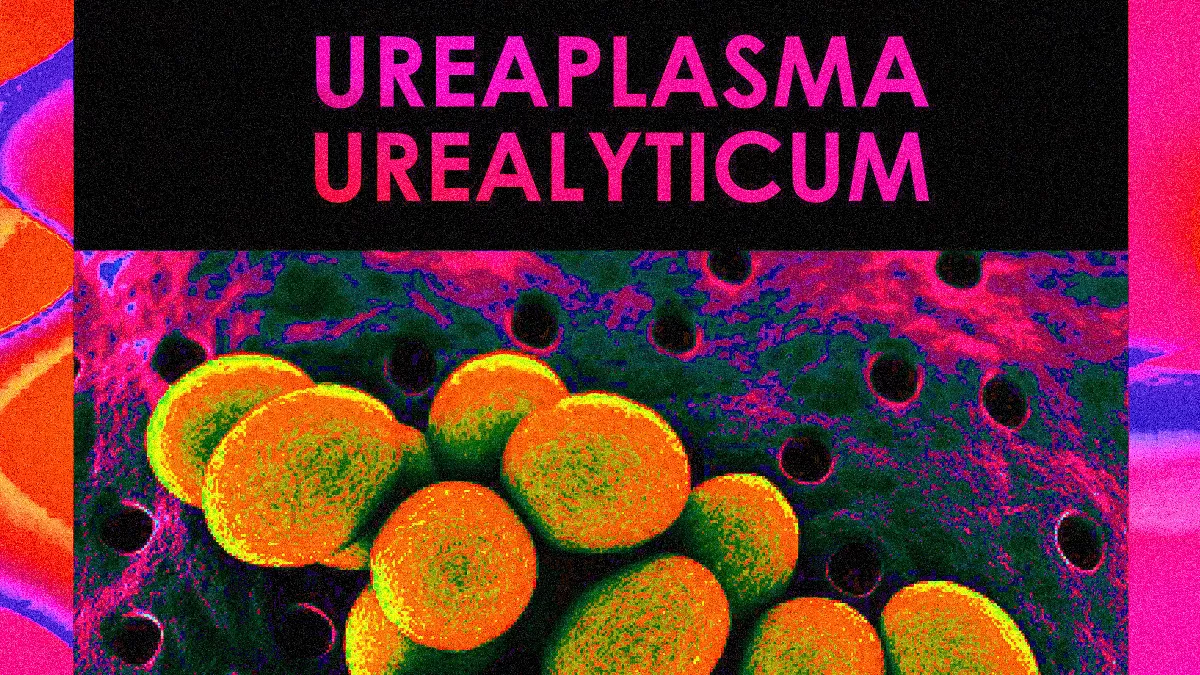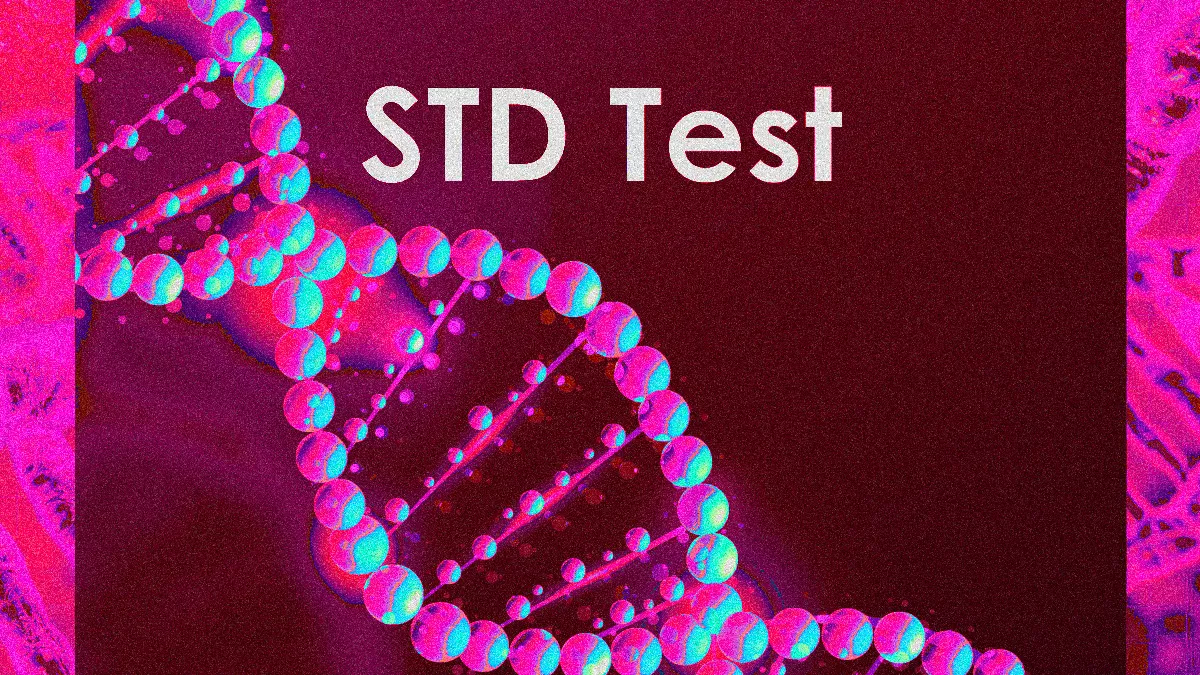Ureaplasma Urealyticum
18207
Ureaplasma is a bacterium that can be passed through sexual contact although it is not considered a classic STI or STD because of its low degree of pathogenicity.

What is Ureaplasma?
Ureaplasma refers to a group of tiny bacteria found in the respiratory and urogenital tracts. They are among the smallest free-living organisms, so small that they can't be seen under a microscope.
Ureaplasma is often a natural part of the human microbiome, which includes trillions of microorganisms that assist with digestion, infection control, and reproductive health.
However, these typically harmless bacteria can sometimes overgrow and cause inflammation in healthy tissues, leading to infection.
Ureaplasma species have been linked to various medical issues, including bacterial vaginosis and complications during pregnancy. While Ureaplasma infections may increase the risk of certain problems, they are not conclusively proven to be direct causes.
Ureaplasma urealyticum is a common infection primarily spread through sexual contact. Though it is not classified as an STI, it is still a bacterial infection.
This genital mycoplasma colonizes the genital tract and can lead to highly contagious infections, potentially increasing the risk of other STIs. Therefore, it’s crucial to undergo comprehensive testing.
Symptoms of Ureaplasma infections are often subtle, meaning many individuals may not realize they are infected. Regular testing for bacterial infections spread through sexual contact is essential to prevent further transmission. Treating Ureaplasma is important, even in the absence of symptoms, for several reasons:
- It reduces the risk of complications such as infertility and meningitis.
- It helps alleviate psychological concerns related to STIs, such as anxiety and stress.
Contact us at info.bkk@pulse-clinic.com or chat on your preferred platform:
![]() +66 65 237 1936
+66 65 237 1936  @PULSEClinic
@PULSEClinic ![]() PulseClinic
PulseClinic
Ureaplasma Symptoms
Ureaplasma is often characterized as urethritis in men and genital tract infections in women. Ureaplasma is also often asymptomatic in many cases and the majority of infected people may not even realise they have the condition. If symptoms do appear, these can be very similar symptoms to urethritis, other STIs, and infections.
Venereological patients (those involved in the study of STIs) are often diagnosed with ureaplasma.
Ureaplasma in men
Ureaplasma is commonly diagnosed in men with epididymitis, which is an inflammation of the area behind the testicle where sperm is stored.
Symptoms may include:
- Burning or pain during urination
- Frequent urination
- Slow urine flow
- Difficulty urinating
- Urethral discharge
Ureaplasma in women
Ureaplasma is frequently diagnosed in conjunction with chorioamnionitis, an infection of the vagina often linked to pregnancy, especially when the infection spreads rapidly.
Symptoms may include:
- Redness and inflammation
- Unusual discharge
- Pain during urination (dysuria)
- Lower abdominal pain
- Vaginal discomfort
- Unusual odor
Another symptom associated with ureaplasma is urethrorrhea, which is the flow of fluid from the urethra. Some women may also experience chronic cystitis or other similar urinary tract infections (UTIs).
What's the difference between ureaplasma urealyticum and mycoplasma genitalium?
Ureaplasma and mycoplasma are often connected. The reason is that they are caused by a different bacterium from the same mycoplasma family.
Mycoplasma is responsible for hundreds of types of bacteria, however, some can cause infections; two of which are ureaplasma urealyticum and mycoplasma genitalium. Other infections include mycoplasma pneumonia, mycoplasma hominins, and ureaplasma parvum.
Both infections require the same antibiotics to treat and cure the infection. It is also common for both bacterial infections to present no symptoms whatsoever. It comes as no surprise that they are often intertwined.
Both ureaplasma and mycoplasma are commonly found in the reproductive tract.
Both can be treated completely, often with doxycycline and azithromycin.
Window Period of Ureaplasma Urealyticum
Duration:
- The window period for Ureaplasma urealyticum typically ranges from 1 week to several weeks after exposure.
- Many individuals may remain asymptomatic for an extended period, which complicates timely diagnosis.
Causes of Ureaplasma
The primary cause of ureaplasma is the transmission of an infectious agent from an infected person to their partner through sexual contact, including vaginal and oral sex. Other potential sources of transmission include saliva, blood (such as through transfusions), air, and needles.
It's important to note that other bacterial STIs, such as chlamydia and gonorrhea, can also lead to ureaplasma and other infections. Infections in the reproductive area can cause scarring and damage, particularly when left untreated, which increases the risk of contracting additional sexual infections. Therefore, undergoing a comprehensive STI check-up when necessary is crucial for preventing the spread of infections and avoiding long-term complications.
Ureaplasma is extremely contagious and is most often spread through sexual contact and unprotected sex with multiple partners. In more extreme cases, you can become infected if you touch an infected person's nose or eye secretions, or if an infected person coughs in your face.
How can I get tested for ureaplasma?
If you are displaying any of the symptoms listed above, then you should book an appointment with your GP or a sexual health clinic, where they will be able to test you for ureaplasma and other STIs by urine test or swab test and the best test is PCR looking for its DNA. An early diagnosis means that you can get treatment straightaway, which will reduce your chances of complications like pelvic inflammatory disease, and infection in the testicles or the brain membrane.
What are the risks of ureaplasma?
While ureaplasma is easily treatable, it often goes unnoticed for months since it rarely presents symptoms. If left untreated, it has been linked to infertility, premature or stillbirth, non-specific urethritis, chorioamnionitis, meningitis, and pneumonia. Prolonged untreated ureaplasma can also spread to other areas of the body, potentially harming your joints, nerves, and muscles. Fortunately, effective treatment for ureaplasma can help prevent these serious health issues.
Prevention for Ureaplasma
Ureaplasma is a fully preventable condition, and you can reduce your risk by following these guidelines:
- Use condoms: This is the safest and most effective way to prevent ureaplasma.
- Limit the number of sexual partners you have.
- Avoid sharing sex toys: If you do share them, be sure to clean them thoroughly and use condoms for added protection.
Attend regular STI screenings, and encourage your partner(s),
to prevent the infection from being passed on.
What treatment options do we offer for ureaplasma?
Currently, the only effective way to treat ureaplasma is through prescription medication. A simple course of antibiotics can successfully address this condition.
There are two main types of antibiotics typically prescribed for complete eradication of ureaplasma: Doxycycline, which is usually taken over a week, and Azithromycin, administered as a single-dose treatment, though it may take up to seven days for the infection to be fully resolved.
If you're unsure which treatment to choose, that’s perfectly okay; just start a consultation, and our partner doctor will recommend the best antibiotics for you. This process takes about ten minutes, and you can receive your order the same day or the next.
Even if your symptoms improve before completing your antibiotic course, it's essential to finish it to prevent the infection from returning.
Contact us at info.bkk@pulse-clinic.com or chat on your preferred platform:
Trust PULSE CLINIC to take care of your health like other 45000 people from over 130 countries. We provide discreet professional service with high privacy. Here to help, not to judge.
PCR Multiplex DNA Test for 28 Infections 




Our STD PCR Multiplex test offers advanced technology to detect up to 28 infections, including Gonorrhea, Chlamydia, Syphilis, Herpes Simplex, Trichomonas, and Candida strains, all in one test. It can identify infections in various anatomical areas, such as the throat, urethra, anorectal region, vagina, cervix, sperm, and skin lesions. For urethral infections, the Urine PCR is recommended, while the Throat Swab PCR is ideal after oral sex. Anal Swab PCR is advised for unprotected anal sex, and the Vaginal Swab PCR is recommended for vaginal sex, with staff guidance available for all tests.
| PCR for 28 Infections (STD Multiplex) | Online results | |||
| Same day** | Next day | 3 days | 7 days | |
| Throat | 14,000 THB | 11,600 THB | 10,480 THB | 9,200 THB |
| Urine | 14,000 THB | 11,600 THB | 10,480 THB | 9,200 THB |
| Anal Swab | 14,000 THB | 11,600 THB | 10,480 THB | 9,200 THB |
| Vaginal Swab | 14,000 THB | 11,600 THB | 10,480 THB | 9,200 THB |
| Cervical Swab | 14,000 THB | 11,600 THB | 10,480 THB | 9,200 THB |
| Sperm | 14,800 THB | 12,640 THB | 11,600 THB | 10,080 THB |
| Skin Lesion Swab | 14,000 THB | 11,600 THB | 10,480 THB | 9,200 THB |
| Pooling | 15,600 THB | 13,280 THB | 12,400 THB | 10,800 THB |
| PCR for 2 Infections (Gonorrhea/Chlamydia) | Same day | Next day | 3 days | 7 days |
| Throat | 5,690 THB | 4,990 THB | 3,990 THB | 3,300 THB |
| Urine | 5,690 THB | 4,990 THB | 3,990 THB | 3,300 THB |
| Vaginal and Cervical Swab | 5,690 THB | 4,990 THB | 3,990 THB | 3,300 THB |
| Rectal Swab | 5,690 THB | 4,990 THB | 3,990 THB | 3,300 THB |
| Sperm* | 6,200 THB | 5,150 THB | 4,100 THB | 3,690 THB |
| Skin lesion Swab | 5,690 THB | 4,990 THB | 3,990 THB | 3,300 THB |
PULSE Teleconsult: Connect with Doctors Anytime, Anywhere!
PULSE now offers PULSE Telemedicine & Teleconsult, enabling both new and existing patients to connect with doctors over 20 branches across 6 countries during clinic hours for non-emergency consultations. After the consultation, medications are delivered directly to the patient's doorstep.
3 Easy Steps to Get a Teleconsult with PULSE!
- Connect with us Either on WhatsApp, or Line App to Chat with us or call us to talk with our staff to request teleconsult.
- Verification & Consultation Our team will guide you through the verification process before your online consultation. Our doctors provide virtual consultations via available platforms, just like a traditional visit—only from the comfort of your home! Access care anywhere, anytime.
- Get Your Treatment From Home! If your doctor determines that medication is necessary, they will provide you with a medical certificate and prescription. Your medication can be delivered to your address through our online delivery service, or in some cases, you may choose to use the prescription at a local pharmacy. For certain conditions, further lab tests may be required, and the doctor may recommend scheduling an appointment at one of our clinics near you!
Test of Cure After Treatment with Our Teleconsult Services: Ensuring Complete Recovery
After completing treatment through our teleconsult services, your doctor may recommend a PCR test as a follow-up test of cure. This is to ensure the effectiveness of the treatment and that the prescribed medication has successfully eliminated the infection. We prioritize your health by confirming that no infection remains in your system, helping to prevent persistent or recurrent infections, complications, or the development of drug resistance. Typically, this test is performed around three weeks after your final day of treatment to ensure optimal results.
Teleconsult is now available for booking through our staff at PULSE Clinic. Our team will help guide you through the process to ensure your session with one of our doctors goes as smoothly as possible for you. Contact us at info.bkk@pulse-clinic.com or chat on your preferred platform:
![]() +66 65 237 1936
+66 65 237 1936  @PULSEClinic
@PULSEClinic ![]() PulseClinic
PulseClinic

Add us on Line and stay in touch.
Loading...
Clinic Locations
Loading...







